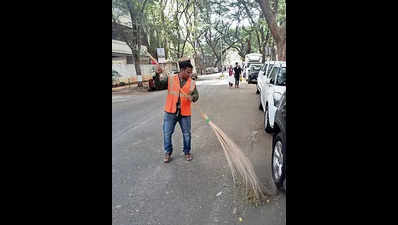After 27-yr battle, 580 contract safai workers to get their due | Mumbai News – The Times of India

It is not to protest but to celebrate that hundreds of conservancy workers will gather at Azad Maidan on April 17 next week. Following a 27-year battle by the waste collectors’ union Kachra Vahtuk Shramik Sangh, the Supreme Court ordered the BMC to grant permanent jobs and back wages to 580 contract safai karamcharis last month. In the longstanding case informally called ‘panch sau assi’, the SC ruled that the workers—many of whom began cleaning and transporting the city’s waste to dumping grounds in 1997—must be considered permanent employees from the day they completed 240 days of service and receive back pay from October 13, 2006. For the KVSS, which earlier won similar fights on behalf of 1250 workers in 2003 and 2700 karamcharis in 2017, the hard-won victory means a “hattrick” while for the panch sau assi workers, around 150 of whom lined up to submit their official documents at the BMC headquarters on April 11, it signals hope of a better life.
“I feel lucky that I am still young. Many of the 580 workers are now dead or retired,” says 45-year-old Diva-based Sunil Jagdale who stands to earn at least Rs 60,000 per month instead of the current Rs 19,000 once the order is executed. “My family still doesn’t believe that my pay will increase. They are tired of waiting,” says Jagdale, who was a 17-year-old college student when he began waking up at 6 am to sweep the roads of central Matunga for Rs 35 a day to support his family.
The year was 1997. In the run-up to the golden jubilee of India’s Independence, the roads of central Mumbai were being scrubbed clean, recalls Ranade who watched conservancy workers eating their lunch atop trucks that stank. “They had to manually load garbage on those trucks. Trash would invariably fall on the sweepers while they climbed the rear ladder,” says Ranade, who saw safai workers being shooed away in buses and trains due to the stench. Compelled to fight for their rights, Ranade organised the workers. The BMC, he says, labeled them as “volunteers” or “self-help group members,” paying them honorariums instead of salaries, denying identity cards, and subcontracting their work to obscure any employer-employee relationship. “They were working 365 days a year, without sick leave, casual leave, or even access to toilets or drinking water,” says Ranade, who filed the case at the Industrial Tribunal in 1998. “The workers didn’t even have attendance cards. There was no no access to water or toilets either,” says Ranade, who first went on a hunger strike, demanding only water. The then municipal commissioner, Ranade says, granted a water tank at the Deonar dumping ground on the third day of their hunger strike. During the 23 years that lapsed beforethe Industrial Tribunal ruled in the workers’ favour in 2021, “the BMC used every tactic to deny workers their rightful dues,” says Ranade.
“Even though we cleaned the roads and gutters assigned to us by the civic body, used the brooms and tools given by the BMC and were subjected to the same rules as the permanent workers, we were always called volunteers on paper,” says 47-year-old Chembur-based Dadarao Patekar, who began working since 1996. Now a father of three, Patekar—-who has graduated from his shanty in Gautam Nagar to an SRA building— says he would have sent his teenage kids to English medium school had his salary permitted it. “Minimum wage is how much it takes to keep a human alive. If you are paid less than that, it means you are not considered worthy of the basic dignity of a human being, right?” asks Patekar, who was one among many who wove garlands from abandoned footwear and shouted slogans such as ‘Joote do ya humse joote lo’ in 2008, to demand the provision of shoes. In 2003, a new tender scattered the 580 workers across wards, shrinking their pay to Rs 60 per day despite a government-mandated minimum wage of Rs 127, says Ranade. “We told them to demand their rightful wage—and they did. That movement brought another 2,700 workers into the union,” says Ranade. While those 2,700 were absorbed in 2017, the original 580 continued to wait.
Since then, garbage trucks have been upgraded to compactors, sparing workers from the stench. Jagdale now commutes daily from Dadar by train. “But there’s still no legal protection for contract labourers,” says Ranade, whose union’s relentless morchas and dharnas won weekly offs, provident fund access and other basic rights—proving these “volunteers” were BMC workers all along. On March 3 this year, came the turning point. The SC ordered the BMC to grant permanent status to the 580 workers, with monetary benefits from October 2006. The court also clarified that those who have since died, retired, or become incapacitated will receive benefits for the time they served. The BMC has four months to implement the order. “Those who were made permanent earlier now eat meaty meals three times a week instead of twice a month,” says Ranade. Patekar, too, is looking forward to a full plate. “A healthy meal should have red, yellow, green and white,” he says. “Maybe now, we’ll finally get there.”
















